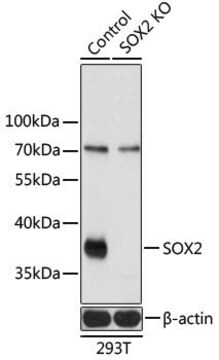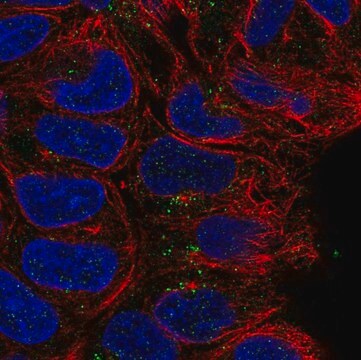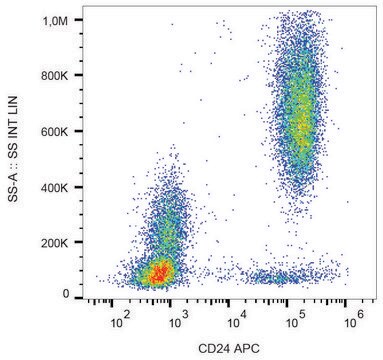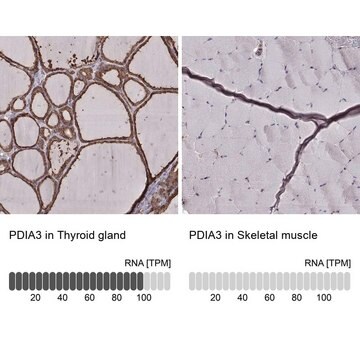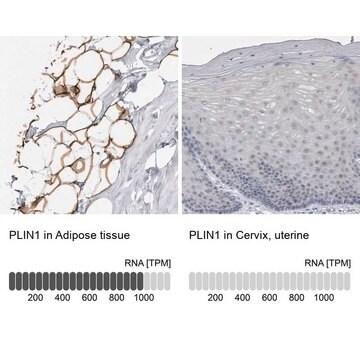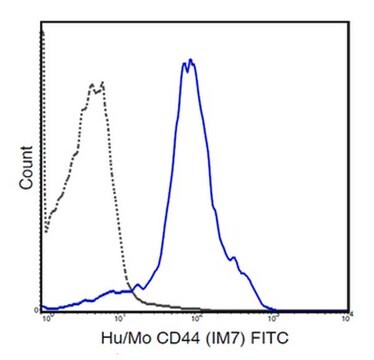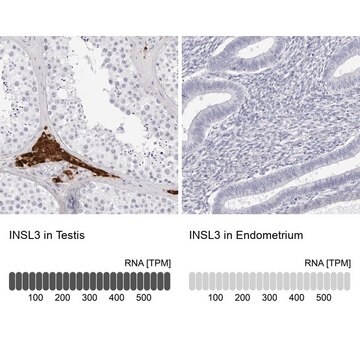SAB4700623
Monoclonal Anti-CD24 antibody produced in mouse
clone SN3, purified immunoglobulin, buffered aqueous solution
Sinônimo(s):
Anti-CD24
Faça loginpara ver os preços organizacionais e de contrato
About This Item
Código UNSPSC:
12352203
NACRES:
NA.41
Produtos recomendados
fonte biológica
mouse
Nível de qualidade
conjugado
unconjugated
forma do anticorpo
purified immunoglobulin
tipo de produto de anticorpo
primary antibodies
clone
SN3, monoclonal
Formulário
buffered aqueous solution
reatividade de espécies
human
concentração
1 mg/mL
técnica(s)
flow cytometry: suitable
Isotipo
IgG1
nº de adesão NCBI
nº de adesão UniProt
Condições de expedição
wet ice
temperatura de armazenamento
2-8°C
modificação pós-traducional do alvo
unmodified
Informações sobre genes
human ... CD24(100133941)
Descrição geral
The antibody SN3 reacts with CD24, a 35-45 kDa heavily glycosylated cell surface antigen. CD24 is expressed by granulocytes, B lymphocytes and by some activated T cells and T cell malignancies. It is not expressed on human thymocytes.
Imunogênio
Glycoproteins purified from human NALM-1 cell line
Aplicação
The reagent is designed for Flow Cytometry analysis. Suggested working dilution for Flow Cytometry is 2-8 μg/mL of sample. Indicated dilution is recommended starting point for use of this product. Working concentrations should be determined by the investigator.
Características e benefícios
Evaluate our antibodies with complete peace of mind. If the antibody does not perform in your application, we will issue a full credit or replacement antibody. Learn more.
forma física
Solution in phosphate buffered saline, pH 7.4, with 15 mM sodium azide.
Exoneração de responsabilidade
Unless otherwise stated in our catalog or other company documentation accompanying the product(s), our products are intended for research use only and are not to be used for any other purpose, which includes but is not limited to, unauthorized commercial uses, in vitro diagnostic uses, ex vivo or in vivo therapeutic uses or any type of consumption or application to humans or animals.
Não está encontrando o produto certo?
Experimente o nosso Ferramenta de seleção de produtos.
Código de classe de armazenamento
10 - Combustible liquids
Ponto de fulgor (°F)
Not applicable
Ponto de fulgor (°C)
Not applicable
Escolha uma das versões mais recentes:
Já possui este produto?
Encontre a documentação dos produtos que você adquiriu recentemente na biblioteca de documentos.
Athanassios Vassilopoulos et al.
The Journal of biological chemistry, 289(35), 24202-24214 (2014-07-10)
Drug resistance and cancer metastasis are two major problems in cancer research. During a course of therapeutic treatment in Brca1-associated tumors, we found that breast cancer stem cells (CSCs) exhibit an intrinsic ability to metastasize and acquire drug resistance through
Thomas Hofner et al.
Urologic oncology, 32(5), 678-686 (2014-03-19)
To evaluate CD24/CD44/CD47 cancer stem cell marker expressions in bladder cancer (BCa) and provide data on their prognostic significance for clinical outcome in patients undergoing radical cystectomy (RC). Primary BCa tissue was used for xenograft studies. A tissue microarray was
Martine Croset et al.
Journal of bone and mineral research : the official journal of the American Society for Bone and Mineral Research, 29(8), 1886-1899 (2014-03-13)
The transcription factor TWIST1 induces epithelial-mesenchymal transition and/or escape to the oncogenic-induced failsafe program, facilitating the intravasation of breast cancer cells in the systemic circulation and their dissemination to the lungs. Its involvement in breast cancer bone metastasis is unknown.
Ying Zhong et al.
Medical oncology (Northwood, London, England), 31(3), 864-864 (2014-02-13)
Breast cancer stem cells are thought to be associated with metastasis and poor prognosis, but their clinical importance remains poorly understood. The aim of this study was to investigate whether certain phenotypes of breast cancer stem cells were clinically important
Chelsea M Black et al.
Cancer immunology research, 2(4), 307-319 (2014-04-26)
A major barrier to vaccines in cancer treatment is their failure to activate and maintain a complete cancer-specific CD8(+) effector T-cell repertoire. Low-avidity T cells are more likely to escape clonal deletion in the thymus when compared with high-avidity T
Nossa equipe de cientistas tem experiência em todas as áreas de pesquisa, incluindo Life Sciences, ciência de materiais, síntese química, cromatografia, química analítica e muitas outras.
Entre em contato com a assistência técnica
